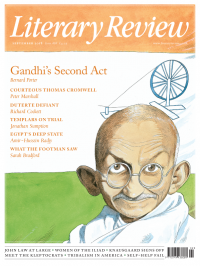Carol Rumens
Metaphysical Modern
Elizabeth Jennings: ‘The Inward War’
By Dana Greene
Oxford University Press 258pp £25
Elizabeth Jennings (1926–2001) saw writing poetry as a sacred vocation. She came of age at a time when the most visible young poets in England were signed up to that religion of the ordinary and the masculine known as The Movement. But her poems delighted her peers. She was designated the star of the journal Oxford Poetry by its editor, ‘the charming Kingsley Amis’, who, I suspect, might have had her in mind when, later, he wrote ‘A Bookshop Idyll’ (‘Women are really much nicer than men:/No wonder we like them’). Even in early love poems, such as ‘Identity’, Jennings was moving towards the transcendental: ‘When I decide I shall assemble you/Or, more precisely, when I decide which thoughts/Of mine about you fit most easily together,/Then I can learn what I have loved, what lets/ Light through the mind’.
Job opportunities for women existed in the postwar literary world of London, but Jennings found it oppressive. She was no less uneasy about sex: perhaps because of her Catholicism and early insecurities, she needed a special kind of human connection, one that was intense yet not physically demanding or emotionally possessive. Friendships with priestly mentors such as Father Aelwin Tindal-Atkinson and strong, gifted women such as the historian Veronica Wedgwood became integral to her happiness and her poetry, one aim of which was to redefine human love as something independent of the body.
Boston, Lincolnshire, was her childhood Eden, lost when the family moved to Oxford when she was six. Confirmation brought confession and its humiliations. Recollections of early childhood often signify redemption: ‘A child watched the sky and said, “Up there”/And “there” meant Heaven for me’ (‘A Sky in Childhood’).

Sign Up to our newsletter
Receive free articles, highlights from the archive, news, details of prizes, and much more.@Lit_Review
Follow Literary Review on Twitter
Twitter Feed
Under its longest-serving editor, Graydon Carter, Vanity Fair was that rare thing – a New York society magazine that published serious journalism.
@PeterPeteryork looks at what Carter got right.
Peter York - Deluxe Editions
Peter York: Deluxe Editions - When the Going Was Good: An Editor’s Adventures During the Last Golden Age of Magazines by Graydon Carter
literaryreview.co.uk
Henry James returned to America in 1904 with three objectives: to see his brother William, to deliver a series of lectures on Balzac, and to gather material for a pair of books about modern America.
Peter Rose follows James out west.
Peter Rose - The Restless Analyst
Peter Rose: The Restless Analyst - Henry James Comes Home: Rediscovering America in the Gilded Age by Peter Brooks...
literaryreview.co.uk
Vladimir Putin served his apprenticeship in the KGB toward the end of the Cold War, a period during which Western societies were infiltrated by so-called 'illegals'.
Piers Brendon examines how the culture of Soviet spycraft shaped his thinking.
Piers Brendon - Tinker, Tailor, Sleeper, Troll
Piers Brendon: Tinker, Tailor, Sleeper, Troll - The Illegals: Russia’s Most Audacious Spies and the Plot to Infiltrate the West by Shaun Walker
literaryreview.co.uk